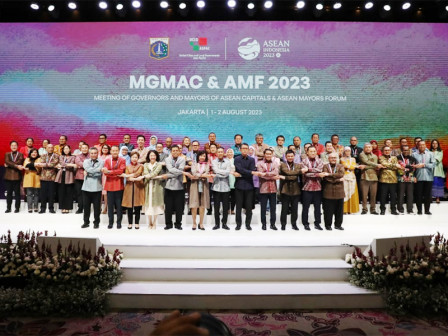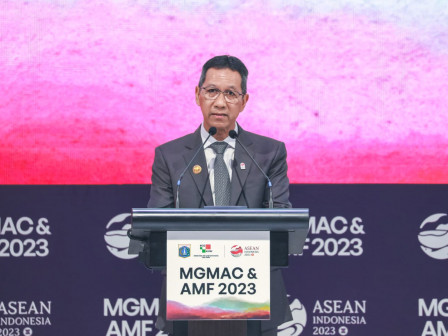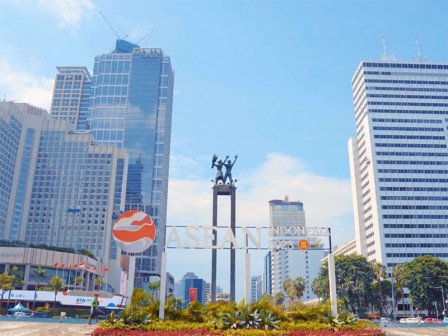Successfully Holding MGMAC and AMF 2023, Jakarta Makes History for Sustainable Development in ASEAN
Reported by Aldi Geri Lumban Tobing | Translated by Nugroho Adibrata
Jakarta successfully held the 2023 Meeting of Governors and Mayors of ASEAN Capitals (MGMAC) and the ASEAN Mayors Forum (AMF) at the Fairmont Hotel, Central Jakarta, Wednesday (8/2).
The Joint Declaration contains an agreement to strengthen cooperation
Jakarta Acting Governor, Heru Budi Hartono said, the second day of the meeting is the MGMAC and AMF trial which produced the text of the Joint Declaration which was agreed upon by delegates from ASEAN countries.
"The Joint Declaration contains an agreement to strengthen cooperation in the field of sustainable urban development in order to support the development of the ASEAN Community," he expressed, in the Jakarta Provincial Government's press release.
Here are Five Strategic Issues Discussed at MGMAC and AMF 2023During the meeting, the handover of the MGMAC Chairmanship was also carried out to Vientiane Governor, Laos, Atsaphangthong Siphandone, symbolically with a Gold Plated Hammer, made of sturdy sonokeling wood symbolizing the city's commitment to building ASEAN. Later, Laos would host the MGMAC and AMF 2024.
"It is our hope that Indonesia's Chairmanship in ASEAN can accept the aspirations of the leaders of ASEAN cities produced in the MGMAC and AMF 2023. Because, we believe that sustainable urban development will support the collective goal of strengthening ASEAN's position as the center of regional economic growth for the prosperity of the ASEAN people and the world," he explained.
ASEAN delegates have signed the MGMAC 2023 Joint Declaration with the following points:
1. Call on ASEAN Leaders to formalize the Meeting of Governors and Mayors of ASEAN Capitals (MGMAC) and the ASEAN Mayors Forum (AMF) to channel the aspirations of local governments that support the ASEAN Community development process, such as enhancing urban-rural relations and the role of intermediary cities to accelerate rural transformation
2. Pursue inclusive economic growth that promotes better living conditions and economic opportunities and guarantees access to sufficient, safe and nutritious food for all, including children, women, youth, the elderly, persons with disabilities, and vulnerable groups
3. Accelerate digital transformation with a coherent, harmonized and rules-based approach for various stakeholders and ensure that ASEAN governments, private sectors and people are equipped with relevant digital transformation skills, competencies and values to tackle the challenges of the Fourth Industrial Revolution/4IR and the ever-changing world of work
4. Committed to addressing the challenges of climate change and the environment by increasing cooperation and partnerships; advancing the linkages between climate action and promoting the conservation and sustainable use of biodiversity and ecosystems; implementation of a nature/ecosystem based approach as well as advances in science, technology and innovation to accelerate the attainment of sustainable resilience; making cities more livable by balancing economic growth with sustainable natural resource use and environmental protection; and prioritizing investments in sustainable mobility that increases the use of public transport, walking and cycling modes to improve people's health and reduce inequalities
5. Strengthen urban health architecture that serves as a foundation for achieving better socio-economic growth and prosperity for ASEAN peoples to ensure more effective prevention, preparedness and response mechanisms in dealing with potential communicable diseases, climate change, and ecosystem degradation
6. Promote green finance to develop and promote private investment in sustainable urban projects through innovative and blended financing schemes to fund urban development initiatives and rely on cost-effective private-business partnerships
Aside that, the ASEAN delegates also committed to the AMF 2023's Jakarta Declaration which contained the following:
1. Call on ASEAN Leaders to normalize the ASEAN Mayors Forum (AMF) and the Meeting of Governors and Mayors of ASEAN Capitals (MGMAC) as integrated ASEAN Sectoral Bodies that channel the aspirations of local governments to deepen ASEAN community-building process
2. Strengthen efforts and reaffirm dedication to implementing the UN 2030 Agenda in line with the ASEAN Community Vision 2025, the ASEAN Sustainable Urbanization Strategy, and the ASEAN Smart Cities Framework. We will enhance regional cooperation, knowledge sharing and capacity building to accelerate progress towards achieving the Sustainable Development Goals. By working together, we aim to create resilient, liveable, inclusive and sustainable cities that enhance the well-being and quality of life for all ASEAN citizens
3. Embrace the principles of sustainability to create resilient, livable and prosperous urban environments for present and future generations. Continuing our commitment to sustainability, we further promote sustainable urban planning and implementation, efficient resource management, inclusive urban economic growth, and climate resilience
4. Follow up on opportunities to contribute to the development of the ASEAN Community Vision Post-2025. With AMF as an entity associated with ASEAN, we will engage our community to develop a visionary Post-2025 Vision that reflects the aspirations and needs of our diverse community, and propel ASEAN towards a brighter, peaceful, and sustainable future
5. Facilitate learning, capacity building, and development opportunities among cities and local governments in ASEAN in line with strategic priorities of ASEAN Community Vision 2025, ASEAN Sustainable Urbanization Strategy, ASEAN Smart Cities Network, and their respective follow-ups. We will strengthen knowledge exchange, peer-to-peer learning, best practice sharing, and technical and managerial cooperation between cities, and local governments
6. Ensure meaningful involvement of women especially in local decision-making processes in cities and local governments in ASEAN. Recognizing the importance of gender equality and women's empowerment, we strive to create an inclusive and gender-responsive environment that promotes women's leadership and participation
7. Promote sustainable economic development for the prosperity of our cities and regions through the development of entrepreneurship and innovation, as well as encourage the development of green and blue economic investments in sectors that generate decent jobs, promote technological and industrial progress for MSMEs, and contribute to urban economic growth we are sustainable. We will also explore synergies with the ASEAN Villages Network to promote rural development
8. Enhance our efforts to reduce greenhouse gas emissions, promote energy efficiency and conservation, and transition to renewable energy sources. We further commit to increasing our adaptive capacity to address climate-related challenges, including sea level rise, extreme weather events, food security, and water management, and to ensure the resilience of our urban, and rural communities
9. Supporting sustainable urban mobility and digital transformation towards better connectivity and quality of life for all ASEAN citizens. With a vision to improve the quality of life for all ASEAN citizens, we will prioritize the development of efficient and inclusive transportation systems that reduce congestion and emissions, and improve accessibility. Embracing smart city solutions, we aim to leverage technology to improve public services, connectivity, and citizen engagement
10. Commit ASEAN Member States (ASEAN Member States or AMS) to create and strengthen the enabling environment, including access to finance, and cross-border economic cooperation and investment, to unlock the potential of cities and local governments. We urge AMS to establish favorable policies, regulations and mechanisms that facilitate financial support for local initiatives. This includes streamlining procedures, providing affordable credit options, and promoting innovative financing models





